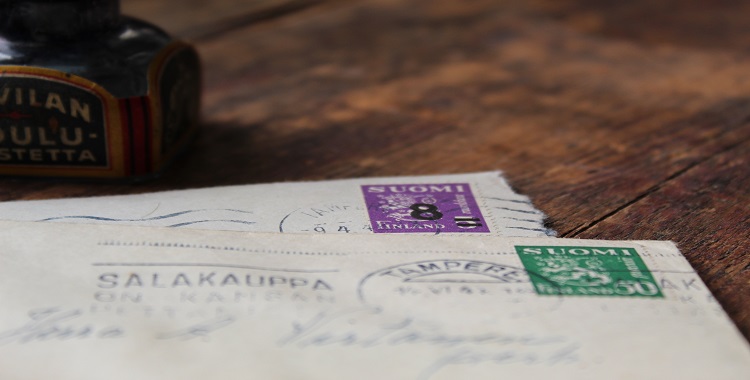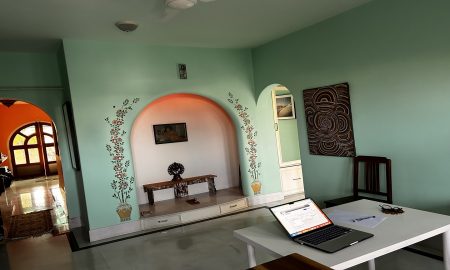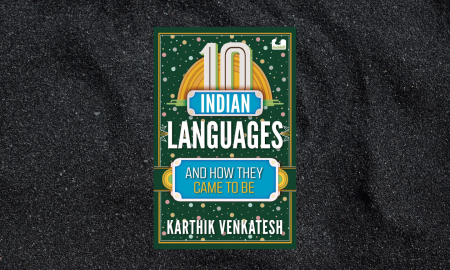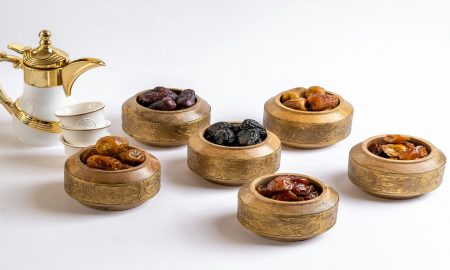It rained all through May in Fruili Venezia Giulia. One Sunday they ran the marathon wearing raincoats and windcheaters. Sidrah put her one-person moka pot on the stove. It was the strong bitter taste of the espresso that kept her going. Last year she had gone home for the summer. It never rains there in May.
There was a steady flow of runners, all headed to the Piazza Unita D’Italia. The Strada Costiera had been blocked since the night before, cutting off all the speeding cars and buses. Sidrah had stayed awake till dawn, listening to the silence. Sometimes, Leon downstairs would bark at a cricket or a firefly. Leon’s barking at night always soothed her. It had been two years, but Sidrah still longed for noise. The blaring car horn, the screaming street peddler, the noisy schoolchildren, the carpenter’s drill or even the relentless cawing of the crow. All at the same time.
Leon had a few friends. Since she had moved into this house a month back, Sidrah often sat at the window and watched them. One day she added adjectives to their names. Boorish Bruce was another dog and he ignored everyone. Lithe Luna was the rabbit, who was in love with Bruce. And the two tortoises – Tough Tugga Tugga and Selfish Simba. Tugga Tugga was, perhaps, the fastest tortoise that ever existed. Leon was just Loveable.
She poured the coffee into her mug and looked out of her window at the dark and dreary day. Leon was nowhere to be seen. The rain had forced him into his kennel. None of the others were out either. She leant out to see if Leon’s nose was pressed against the kennel window.
‘Gooood morning!’ yelled Roseanna from the window upstairs. ‘Another sorry day for you, no?’
‘Yes. When do you think it will stop raining?’ Sidrah asked.
‘No, no, is good. The rain. Last few months… very dry,’ she smiled. ‘But you feel sad. You miss home.’
‘It’s fine,’ Sidrah lied.
Roseanna Berti was the landlady, she lived in the apartment just above Sidrah’s. She was at least a foot and a half taller. And even if they managed to beat the language barrier, their conversations often got lost in between their heights. Every evening she carried her bicycle down from the third floor and went cycling for an hour. Sometimes Sidrah would see her working in the garden, cleaning after the animals, tearing out the unwanted weeds. Every two days she left a huge bowl of cherries outside Sidrah’s front door. There was one this morning as well.
‘Thank you for the cherries. They are very sweet,’ Sidrah smiled.
‘From tree in my garden. You take also.’ Roseanna said.
‘Thanks. I would love to,’ Sidrah replied.
‘My daughter… she a city girl. She no like… garden, animals,’ Roseanna said sadly.
Sidrah had never seen a young girl around. Though one day when the garage door was open, she had spotted a pink cycle with a Little Mermaid helmet balanced on the handle. And a rainbow-coloured hula-hoop.
‘Is she in school?’ she asked
‘Yes, in Rome. College. Big city, many buildings, many people. But no mother. She misses now.’
Sidrah thought of her own mother. Her long dark tresses and her big-toothed smile. Her soft printed cotton saris, always the best place to wipe soap-washed hands and face. Her unusually tense nature or even just her smell.
***
Sidrah didn’t enjoy cooking. Roseanna had lent her some pots and pans when she first moved in. They hung by the hooks near the stove, untouched. Sometimes, though, the intense longing for the familiar made her do unusual things. So on another Sunday, as Sidrah bit into a stale slice of pizza for lunch, she decided to cook her mother’s special prawn curry. The big bearded man, who attended the fish section at the Coop store in Roiano, raised his eyebrows at her. She hadn’t realised he had even noticed her before.
‘Oggi vuoi comprare pesce?’ [Today you want to buy fish?]
‘Si, gamberi [Yes, prawns],’ Sidrah replied.
‘Gamberi freschi, vino bianco, mwah [Fresh prawns, white wine, mwah],’ he guffawed and kissed his fingers.
‘Grazie!’ she smiled back.
On the way back, on bus no.6, at Barcola she gave up her seat to an old woman. She patted Sidrah on the back, her face wrinkled in a bright toothless smile and gave her a few Kinder Schoko-bons.
Later in the kitchen, none of the drawers produced a tin opener. So Sidrah used a knife to slice through the top of the coconut milk jar. As she jabbed the knife for the third time, a razor sharp edge of the tin went through her right hand index finger. As blood oozed out, she frantically looked around for something to plug the wound. She found the first-aid box she had taken out of her mother’s carefully stocked medicine cupboard. Amongst the strips of paracetamol and Digene, she found a lump of cotton. And a small tube of T-bact.
The prawn curry abandoned, she sent an email to Roseanna. She wanted to ask her where she could go for an anti-tetanus shot. That’s the first thing they would do back home. When a cousin of hers was studying medicine, he would insist on giving them tetanus shots even if they got scratched by a tree branch. There might be one in a million chance of getting the infection, he would argue.
Five minutes later there was a knock on the door. It was Roseanna.
‘My husband is doctor. Can you show him how you cut?’ she asked.
‘Of course.’
A handsome dark-haired man in blue pajamas and slightly unruly hair appeared at the doorway. He had very clearly been rudely woken up from his afternoon nap. Sidrah showed him the coconut milk tin.
‘I am hundred per cent sure. No tetanus shot needed,’ he smiled. ‘What have you put here?’
She pointed at the tube of T-bact. Dr Berti picked it up and with narrowed eyes read the tiny letters on the tube.
‘Ah, Mupirocin. This is good. Keep putting this,’ he said.
Then he nodded at Roseanna and she disappeared upstairs. She came back with a huge bottle with a pink liquid, more cotton and some band-aids. Dr Berti cleaned the cut with the liquid.
‘I am cleaning it with alcohol,’ he said.
He then dressed the wound with much care. They left the entire bottle of alcohol, a big bag of cotton and many band-aids on the kitchen table.
‘No give back, okay,’ Roseanna said seriously. With tears threatening to spill out, Sidrah nodded her head. Somedays when even the espresso didn’t help, it was Roseanna that kept her going.
***
As the weather started warming up, Sidrah began taking long walks. The institute was quite deserted by now. Last week her best friends went home as well. Disha to Delhi and Azeema to Karachi.
The area around was simply breathtaking. If she walked down the stone steps next to the parking lot, there was the Grignano pier, the row of fish restaurants and a gate that led up to the Miramare castle and its sweeping gardens. She often sat at the pier, watching the white fishing trawlers clanking against each other. There would be gigantic tourist buses, filled with schoolchildren, trying to wind themselves through the narrow road. Sometimes she stood outside Tavernetta al Molo and re-read a New York Times review they had framed on their outside wall. It said the ravioli stuffed with fish, and the large grilled sea bass with grilled vegetables were unforgettable. But the prices were beyond her meagre graduate student stipend. The stern looking owners never welcomed her in anyway.
And sometimes she walked into the castle gardens. The locals called it the Castello di Miramare.
One day she overheard a guide talking to a group of tourists. He was telling them about the big curse that haunts Castello di Miramare. Built in the 1860s by the Archduke Ferdinand Maximilian of Hapsburg for his beloved wife Charlotte of Belgium, the castle served as a getaway love nest for the couple. Soon after they moved into the castle, Maximilian took up the throne of Mexico. They became Emperor Maximilian I and Empress Carlota of Mexico. Within a few years, Maximilian was shot dead by Benito Juarez’s troops. Charlotte found it impossible to accept her husband’s death, went insane and lived the rest of her life in solitude. She continued to preserve all his belongings. During this time, in a fit of insanity Charlotte had cursed the castle. And ever since anyone who slept there had died under harsh circumstances.
Sidrah sat on a bench overlooking the castle for an hour that day. Slowly the tourists filtered away, the gelato truck drove away. The sun set amidst dark clouds on the Adriatic Sea. She felt alone. She was alone.
It was almost 7pm and the gates would close soon. She slowly walked back up to her house, once in a while turning back to look at the castle. She wrote to her mother that evening, telling her she wanted to go home. Followed by two more lines, telling her she was perfectly fine.
***
The next day as Sidrah was leaving for the institute, she saw Roseanna in the garden. Luna was chasing Bruce around, their paws deep in the mud.
‘Gooood morning,’ she said in her usual bright manner.
‘Hi,’ Sidrah opened the iron gate and went into the garden. ‘I went into the Castello gardens yesterday.’
‘Good. Very beautiful Castello gardens, yes?’ Roseanna smiled.
‘Have you heard about the curse?’
‘About what?’ she looked confused.
‘That everyone who has lived there has died a violent death,’ Sidrah said.
‘Ah la maledizione! Si, Si. Everybody say that.’
‘It really bothered me,’ Sidrah said with a shiver.
‘Is silly. My daughter also scared,’ she giggled. ‘You go up. Up to Prosecco.’
‘I have never walked to Prosecco. I have passed it on the bus while going to the Grotta Gigante a couple of times.’
‘Si, si! Nice village. There is good path… near Miramare station,’ she pointed left. ‘There was funicular tram from Piazza Oberdan in Trieste, but accident… closed. Go before dark.’
***
It was 4pm when Sidrah walked past her Institute and the Galileo Guest House, towards the Miramare station. The old stone steps up were not easy to find, hidden under the canopy on the outside wall of a sprawling house. The steps were slightly broken and covered in moss, but not difficult to climb. They led to a stretch of level land. The vista on the right side was the shimmering azure of the Adriatic Sea, dotted haphazardly with white sailboats. Sidrah stood at the crumbling railing to admire the beauty of the magically blended colours.
Far away the giant rusted crane ‘Ursus’ at Molo 4, stood stoically on the sea. Clearly it had lived through the World Wars and had myriad stories to tell. Behind the crane, was downtown Trieste. The gothic administrative buildings at Piazza Unita D’Italia and the green roofed Hotel Savoia. Just above it was the Castello di San Guisto. A little further away the historic lighthouse scowled down at everyone. The splendor of this city always took Sidrah’s breath away. Every night when she wrote about the day’s happenings to her mother, she always wrote at least one line about how spectacular the city was. How lucky she was to live here. Followed by two more lines, to say that her mother was actually the lucky one.
The old stone steps were back again. At one corner was a signboard, with an arrow pointing upwards and the name Prosecco written in both Italian and Slovenian. The border was not very far now. The trees were now getting denser as a deep karst sinkhole appeared on one side. Half an hour into the walk up, Sidrah realised she had not encountered another soul. And an hour later, the scene hadn’t changed. But an end to the steps was now visible, a road and traffic loomed in the not so distant horizon. The narrow dusty road winded past small deserted vineyards. Once in a while a car speeded past her. In a few minutes, there were houses with huge front gates and signs of Attenti al Cane [Beware of Dogs]. Sidrah guessed she had reached Prosecco. A chalkboard alongside the road read, Ristorante Be Happy. She was immediately drawn in.
An old brown-haired woman was at the bar just inside the entrance. She must have been in her late sixties. Her stern face broke into a smile as she took in Sidrah’s tired countenance.
‘Buonasera,’ she said. ‘Come in, come in.’
‘Hi. I just wanted a drink and maybe a pizza,’ Sidrah smiled back at her.
‘Yes, yes. Come and sit,’ she said in crisp English.
It was a small restaurant with only four tables. And the woman seemed to be the only one around.
‘Do you have spritz?’ Sidrah asked.
‘Of course. And I have a spicy Pizza Diavola. Would you like one?’
‘Sure, sounds good,’ Sidrah replied.
‘I am Anita,’ the woman said over her shoulders.
In the days that followed Sidrah climbed up to Prosecco every evening. Rushing to Ristorante Be Happy for whatever Anita had cooked that day. Sometimes she felt like wiping her wet hands with Anita’s apron. She wrote to her mother, telling her that she should learn to cook from Anita. Followed by two more lines, to say that she was the best cook in the world and didn’t really need to learn from anyone.
One day as she took a bite of her pasta, she took out a textbook from her bag.
‘No, no. When you eat and drink, you must not study. You need to enjoy your food,’ Anita sat down opposite. She had a cup of tea in her hand.
‘Darjeeling,’ she said pointing at her cup. ‘I can’t drink anything else,’ she said, inhaling the flavour. ‘I go to the Bangladeshi woman’s store on Via di Torre Bianca in Trieste every month just for this.’
‘What?’ Sidrah was stunned.
‘Yes. You know, I once travelled a bit and spent two years in India,’ she smiled at Sidrah’s shocked expression.
‘How did you reach India?’
‘Well, I was born not far from here, in Campo Sacro. I was very ambitious. But I was told to stay at home while my brother went for higher studies. So, one day, I just left. And ended up in India.’
‘But how?’
‘Don’t ask me how,’ Anita laughed.
‘I was in Panjim almost the entire time. It was nice. Plenty of drugs, music, dancing… sex,’ she winked.
‘How old were you?’
‘About 20 or so. Then I travelled to Bombay with a few of the others. I also acted in a B-grade Bollywood film.’
‘What?!’
‘Yes. As soon as they saw us, they rewrote the script and changed the entire set,’ she laughed. ‘I remember I was supposed to die in the last scene. So they made me lie down on a table in a nightclub and poured a lot of ketchup on me,’ she laughed.
‘Ketchup?’
‘My friends later told me never to watch the film – it was horrible,’ she quipped.
Sidrah turned her bewilderment into words for her mother. She wrote how all women should be as brave as Anita. Followed by two more lines, to say that her mother was the bravest of them all anyway.
‘So, after two years you returned to Italy?’ Sidrah asked a few days later.
‘Yes, I wanted to see my mother again. I had very little money so I hitchhiked through Pakistan and Afghanistan. One night in Pakistan, a group of men with guns knocked on my hotel door. They wanted me to leave as they thought I was a bad example for their women.’
‘What did you do then?’ Sidrah asked with a shiver.
‘I just left and started walking into the darkness.’
‘It’s just unbelievable!’
‘It was all fine. I am still here, aren’t I?’ Anita smiled.
‘Yes, you are.’
That night when Sidrah wrote to her mother, she told her how thankful she was that Anita was still alive. Followed by two more lines, to say how terribly bitter she was that her mother wasn’t.
***
Photo by Anne Nygård on Unsplash





